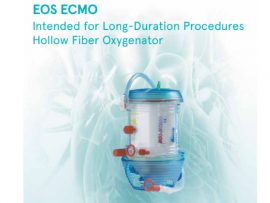Abstract Cardiogenic shock (CS) is a highly complex clinical condition that requires a management strategy focused on early resolution of the underlying cause and the provision of circulatory support. In..
Read MoreAbstract Cardiogenic shock (CS) is one of the most challenging areas in cardiology, where hard evidence is often limited. Several factors contribute to this scarcity. Patients with CS are typically..
Read MoreAbstract Summary Cardiogenic shock is a complex syndrome defined by systemic hypoperfusion and inadequate cardiac output arising from a wide array of underlying causes. Although the understanding of cardiogenic shock..
Read MoreAbstract Cardiogenic shock is a critical condition that affects up to 10% of patients hospitalized with acute myocardial infarction (AMI), representing the primary cause of death in this group [, ]...
Read MoreAbstract Endothelial injury is usually considered as a major com-ponent of the systemic inflammatory response observed during veno-arterial extracorporeal membrane oxygena-tion (VA-ECMO) support. Yet, few data are avail-able to support..
Read MoreAbstract Background Central venoarterial extracorporeal membrane oxygenation (VA-ECMO) is a commonly employed strategy to support patients in refractory postcardiotomy cardiogenic shock (RPCS). This support can be provided using either indirect..
Read MoreAbstract Endothelial injury is usually considered as a major com-ponent of the systemic inflammatory response observed during veno-arterial extracorporeal membrane oxygena-tion (VA-ECMO) support [1, 2]. Yet, few data are avail-able..
Read MoreAbstract The management of cardiogenic shock is an ongoing challenge. Despite all efforts and tremendous use of resources, mortality remains high. Whilst reversing the underlying cause, restoring/maintaining organ perfusion and..
Read MoreIntroduction: Picture this: You're standing at the bedside of a critically ill patient in the ICU, their life hanging by a thread as cardiogenic shock takes hold. The monitors are..
Read MoreAbstract Despite advances in therapy, the incidence of cardiogenic shock continues to increase, with significant mortality that has improved minimally over time. Treatment options for cardiogenic shock are complex and..
Read MoreAbstract Despite multimodal treatment of patients with (CS) complicating (AMI), the outcome remains poor. Large retrospective analyses and animal models suggest that (ECLS) in CS-complicating AMI improves outcome . However, to date, no assessing the..
Read MoreAbstract Purpose Veno-arterial extracorporeal life support (ECLS) is increasingly used in patients during cardiac arrest and cardiogenic shock, to support both cardiac and pulmonary function. We performed a systematic review..
Read MoreAbstract Purpose of review Discussing the rationale and current evidence for left ventricular unloading in cardiogenic shock. Recent findings Microaxial flow pumps (MFP) and intra-aortic balloon pumps (IABP) augment cardiac..
Read MoreAbstract Acute myocardial infarction-related cardiogenic shock (AMI-CS) carries a dismal prognosis. Short-term mortality is in the range of 40–50% []. Until recently, only treatment of the culprit lesion by percutaneous..
Read MoreAbstract The use of mechanical circulatory support using percutaneous ventricular assist devices (pVAD) has increased rapidly during the last decade without substantial new evidence for their effect on outcome. In..
Read MoreAbstract Background Women are at higher risk of mortality from many acute cardiovascular conditions, but studies have demonstrated differing findings regarding the mortality of cardiogenic shock in women and men...
Read MoreAbstract Background Risk-stratifying patients with (CS) is a major unmet need. The recently proposed Society for Cardiovascular and Interventions (SCAI) staging system for CS severity lacks uniform criteria defining each stage. Objectives..
Read MoreAbstract DESPITE MEDICAL ADVANCEMENTS, mortality in cardiogenic shock (CS) remains unacceptably high.The decreased cardiac output resulting in impaired oxygen delivery characteristic of CS triggers a dismal cascade culminating in tissue..
Read MoreAbstract Purpose: The outcomes of immunocompromised patients with cardiogenic shock treated with venoarterial extra‑corporeal membrane oxygenation (VA‑ECMO) are seldom documented, making ECMO candidacy decisions challeng‑ing. This study aims (1) to..
Read MoreAbstract Predictive survival models have been proposed to esti-mate survival rates in patients with refractory cardio-genic shock considered for veno-arterial extracorporeal membrane oxygenation (VA-ECMO) [1, 2]. Notably, the Survival after..
Read MoreAbstract Over the past decade, extracorporeal life support (ECLS) has gained increasing utilization in the management of refractory cardiogenic shock (CS) with a class IIaC recommendation according to the latest..
Read MoreAbstract Acute myocardial infarction-related cardiogenic shock (AMI-CS) carries a dismal prognosis. Short-term mortality is in the range of 40–50% [1]. Until recently, only treatment of the culprit lesion by percutaneous..
Read MoreAbstract Purpose of review This article offers an overview of recent randomized controlled trials (RCTs) testing the efficacy of veno-arterial extracorporeal membrane oxygenation (VA ECMO) and microaxial flow pump (mAFP)..
Read MoreAbstract Aims This study evaluated how well serial pulse pressure (PP) and PP adjusted by the vasoactive inotropic score (VIS) predicted venoarterial extracorporeal membrane oxygenation (VA-ECMO) weaning success and clinical..
Read MoreAbstract Despite immediate coronary revascularization, mortality of patients experiencing infarct-related cardiogenic shock (AMICS) remains high [1]. Over the past decade, there has been a growing interest in the use of..
Read MoreAbstract Weaning and liberation from VA ECMO in cardiogenic shock patients comprises a complex process requiring a continuous trade off between multiple clinical parameters. In the absence of dedicated international..
Read MoreAbstract The objective was to investigate the outcomes of concomitant venoarterial extracorporeal membrane oxygenation (ECMO) and left ventricular unloading with Impella (ECPELLA) compared with ECMO alone to treat patients affected..
Read MoreAbstract The utilization of temporary mechanical circulatory support (tMCS) has increased significantly over the last 40 years for stabilization of salvageable patients; however, there has not been much improvement in..
Read MoreAbstract Background: The purpose of this investigation was to evaluate the impact of venoarterial extracorporeal membrane oxygenation (VA–ECMO) integrated hemoadsorption on the reversal of multiorgan and microcirculatory dysfunction, and early..
Read MoreAbstract Objective Although (ECLS) has increasingly been used for the of patients with (CS), the outcomes of those successfully weaned from support remain poorly defined. Methods Of 510 venoarterial ECLS CS patients at..
Read More
















